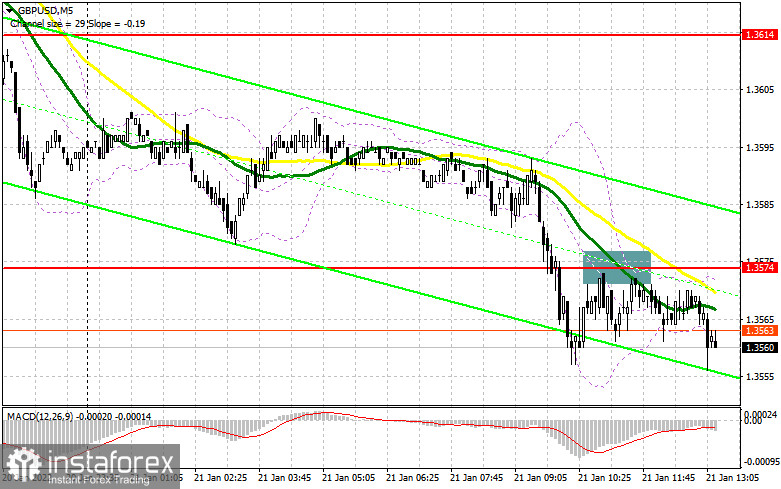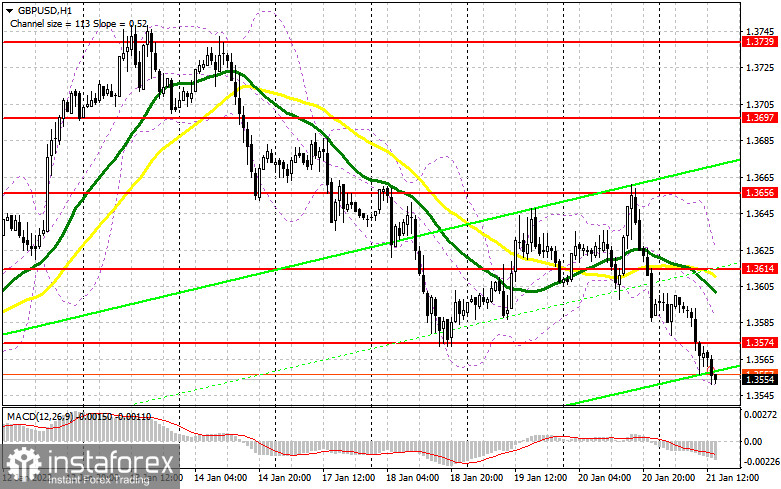To open long positions on GBP/USD, you need:
In the first half of the day, I paid attention to the level of 1.3574 and recommended making decisions on entering the market. Let's look at the 5-minute chart and figure out what happened. The breakthrough of the 1.3574 level immediately after the weak retail sales data in the UK, and then the reverse test of this area from the bottom up - all this led to the formation of a sell signal for GBP/USD, which continues to operate at the time of writing. The pair has already gone down about 20 points. From a technical point of view, practically nothing has changed in the afternoon. And what were the entry points for the euro this morning?

In the afternoon, the focus will probably be on the speech of US Treasury Secretary Janet Yellen, as only her statements can affect the bearish market sentiment. If Yellen touches on the topic of high inflation and once again points to its high level - the fall of the British pound is unlikely to be avoided. The main goal of the bulls for the second half of the day is now to regain control over the resistance of 1.3574, which acted as support in the morning. A breakout and consolidation above this range with a reverse test from top to bottom will give a buy signal with the prospect of a return to 1.3614, where the moving averages are playing on the side of the bears. A breakthrough in this area will quickly push the pound even higher - to the area of 1.3656, where I recommend taking profits. However, this is unlikely in the current market. In the scenario of a decline in GBP/USD during the American session, against the background of strong data on the index of leading indicators of the United States, it is best to postpone purchases to the level of 1.3532, from where it will be possible to observe more aggressive actions of bulls. The formation of a false breakdown at this level will give an entry point based on the recovery of GBP/USD. You can buy the pound immediately on a rebound from 1.3496, or even lower - from a minimum of 1.3461, counting on a correction of 20-25 points within the day.
To open short positions on GBP/USD, you need:
The bears are still actively showing themselves and have achieved the tasks set for them in the first half of the day. Their "mission" for today will be to protect the resistance of 1.3574, as well as to close the week below this range - a strong signal for a further fall of the pound next week. If the pair grows during the American session, only the formation of a false breakdown at this level forms the first entry point into short positions, followed by a fall of the pair to the area of 1.3532. Strong data on the US and taking control of this level will give a new entry point into short positions based on the decline of GBP/USD by 1.3496 and 1.3461, where I recommend fixing the profits. If the pair grows and sellers are weak at 1.3574, the bears may start closing short positions, which will lead to a sharper increase in the pound. Therefore, I advise you to postpone sales until the next major resistance at 1.3614, where the moving averages are. I also advise you to open short positions there only in case of a false breakdown. You can sell GBP/USD immediately for a rebound from 1.3656, or even higher - from this month's maximum in the area of 1.3697, counting on the pair's rebound down by 20-25 points within a day.

The COT reports (Commitment of Traders) for January 11 recorded an increase in long positions and a reduction in short ones, which indicates the continued attractiveness of the pound after the Bank of England raised interest rates at the end of last year. If you look at the overall picture, the prospects for the British pound look pretty good, and the observed downward correction makes it more attractive. The decision of the Bank of England continues to support buyers of risky assets in the expectation that the regulator will continue to raise interest rates this year, which will push the pound even higher. High inflation remains the main reason why the Bank of England will continue to tighten its monetary policy. Last week, Federal Reserve Chairman Jerome Powell said that he would not force events and rush to raise interest rates, especially given the sharp decline in retail sales in December last year, which should cool down inflationary pressure a little. This led to a decrease in demand for the US dollar, which will allow buyers of the pound to continue building an uptrend. The COT report for January 11 indicated that long non-commercial positions increased from the level of 25,980 to the level of 30,506, while short non-commercial positions decreased from the level of 65,151 to the level of 59,672. This led to a change in the negative non-commercial net position from -39,171 to -29,166. The weekly closing price rose from 1.3482 to 13579.
Signals of indicators:
Moving averages
Trading is conducted below 30 and 50 daily moving averages, which indicates a further decline in the pound trend.
Note. The period and prices of moving averages are considered by the author on the hourly chart H1 and differ from the general definition of the classic daily moving averages on the daily chart D1.
Bollinger Bands
A breakthrough of the lower limit of the indicator in the area of 1.3550 will lead to a larger drop in the pound. In the case of growth, the upper limit of the indicator in the area of 1.3630 will act as resistance.
Description of indicators
- Moving average (moving average determines the current trend by smoothing out volatility and noise). Period 50. The graph is marked in yellow.
- Moving average (moving average determines the current trend by smoothing out volatility and noise). Period 30. The graph is marked in green.
- MACD indicator (Moving Average Convergence / Divergence - moving average convergence/divergence) Fast EMA period 12. Slow EMA period 26. SMA period 9
- Bollinger Bands (Bollinger Bands). Period 20
- Non-profit speculative traders, such as individual traders, hedge funds, and large institutions that use the futures market for speculative purposes and meet certain requirements.
- Long non-commercial positions represent the total long open position of non-commercial traders.
- Short non-commercial positions represent the total short open position of non-commercial traders.
- Total non-commercial net position is the difference between the short and long positions of non-commercial traders.





















